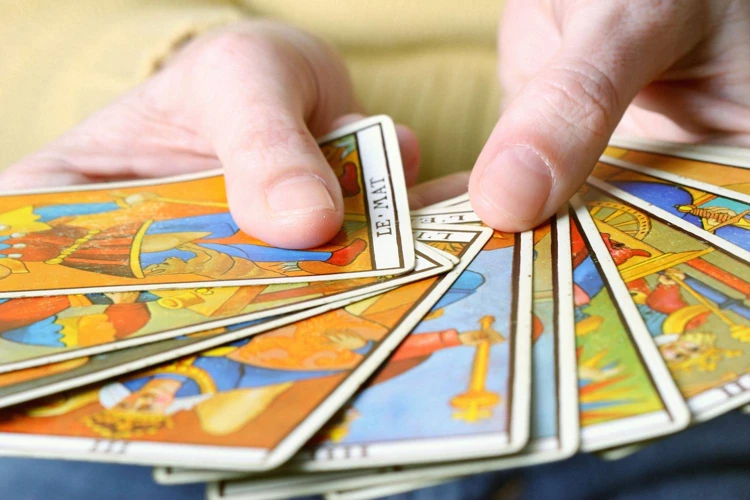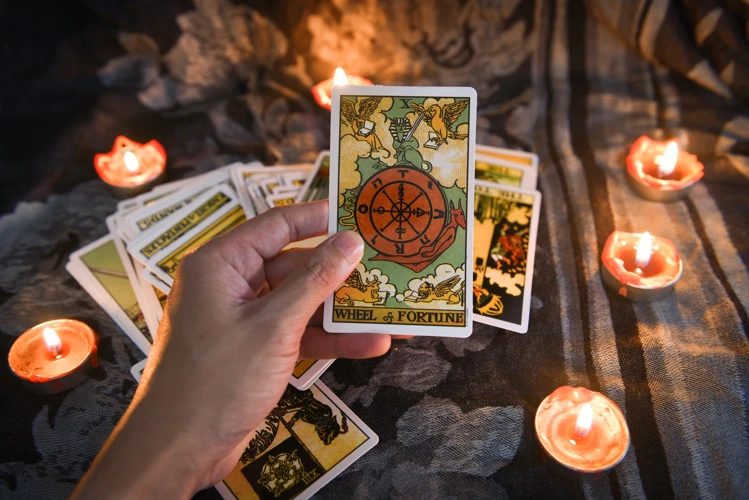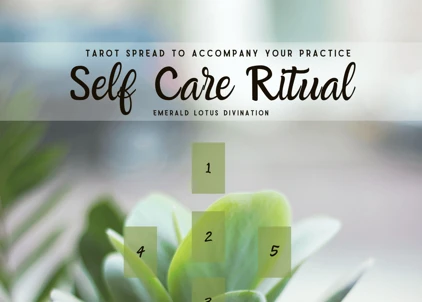Are you looking for a way to enhance your self-care routine? Look no further than creating a tarot ritual. Tarot rituals are a powerful tool for self-reflection and emotional well-being, allowing you to connect with your inner self and cultivate mindfulness and awareness. In this article, we will guide you through the step-by-step process of creating a tarot ritual for self-care, from preparing for the ritual to performing it, and even enhancing it with additional self-care practices. So, grab your tarot deck and get ready to embark on a journey of self-discovery and self-care.
Contents
- Why Tarot Rituals Matter
- Preparing for Your Tarot Ritual
- Performing Your Tarot Ritual
- Enhancing Your Tarot Ritual with Self-Care Practices
- Conclusion
-
Frequently Asked Questions
- 1. Can I use any tarot deck for my tarot ritual?
- 2. How do I create a sacred space for my tarot ritual?
- 3. Do I need to be an experienced tarot reader to perform a tarot ritual?
- 4. How do I choose the right tarot spread for my ritual?
- 5. What role do supplementary tools like candles, incense, or crystals play in a tarot ritual?
- 6. How do I ground and center myself before starting the ritual?
- 7. What is the purpose of journaling and self-reflection during the tarot ritual?
- 8. How can I incorporate meditation and breathing techniques into my tarot ritual?
- 9. What are affirmations, and how can I use them during my tarot ritual?
- 10. How can I adapt my tarot ritual for specific needs or goals?
- References
Why Tarot Rituals Matter

Tarot rituals hold significant importance in the realm of self-care for various reasons. Firstly, by engaging in tarot rituals, you can connect with your inner self on a deeper level. Through the symbolism and archetypes depicted in tarot cards, you can gain insights and guidance from your subconscious mind. This inner connection fosters a greater understanding of your desires, fears, and hopes, allowing for personal growth and self-discovery. Secondly, tarot rituals facilitate mindfulness and awareness in the present moment. As you shuffle and interpret the cards, you become fully present, focusing your attention on the messages they convey. This practice cultivates a state of mindfulness, enabling you to step away from the distractions of daily life and engage with the present moment. Lastly, tarot rituals promote self-reflection and emotional well-being. By delving into the meanings of tarot cards, you can gain insights into your emotions, thoughts, and experiences. This process encourages self-reflection, helping you to identify patterns, heal past wounds, and make positive changes in your life. Tarot rituals are a powerful tool for self-care, aiding in self-discovery, mindfulness, and emotional well-being. Find out more about the transformative power of tarot card readings.
1. Connecting with Your Inner Self
Connecting with your inner self is one of the essential aspects of a tarot ritual for self-care. The practice of tarot allows you to delve deep into your subconscious mind and tap into your intuition. Through the cards, you can gain insights into your emotions, desires, and innermost thoughts. When you connect with your inner self during a tarot ritual, you create a sacred space for exploration and self-discovery. This connection is fostered by the symbolism and archetypes present in the tarot deck, which act as a mirror reflecting your inner world back to you. By engaging with the cards and their meanings, you can access hidden aspects of yourself, uncover hidden truths, and gain a deeper understanding of your own needs and desires. This process of self-reflection and introspection is a powerful tool for personal growth and self-awareness. To enhance your experience of connecting with your inner self during a tarot ritual, consider incorporating tarot meditation techniques into your practice. These techniques help you quiet the mind, focus your intention, and deepen your connection with the cards and their messages. Embracing the practice of connecting with your inner self through tarot rituals opens up a rich and transformative journey of self-exploration and self-care.
2. Cultivating Mindfulness and Awareness
Cultivating mindfulness and awareness is a vital aspect of tarot rituals that can greatly benefit your self-care practice. During a tarot ritual, you engage in a focused and intentional exploration of the cards, which allows you to develop a heightened sense of mindfulness. By paying close attention to the symbols, imagery, and messages conveyed by the cards, you become fully present in the moment, setting aside any distractions or worries that may be occupying your mind. This state of mindfulness enables you to connect with your inner self and the guidance that the tarot cards offer. It helps you develop a deep and non-judgmental awareness of your thoughts, emotions, and experiences.
To cultivate mindfulness and awareness during your tarot ritual, you can incorporate various practices:
1. Meditation: Begin your tarot ritual with a short meditation to quiet the mind and center yourself. Focus on your breath, allowing yourself to let go of any tension or preoccupations. This practice helps create a calm and receptive state of being, enhancing your ability to be fully present during the tarot reading.
2. Grounding: Grounding techniques, such as visualizing roots growing from your feet into the earth, can help anchor you in the present moment. This practice provides stability and a sense of rootedness, which supports your mindfulness practice.
3. Observation: As you lay out the tarot cards, take a moment to observe and appreciate their artwork and symbolism. Notice the colors, patterns, and details on each card. This act of observation helps you to stay present and engaged with the reading.
4. Intention setting: Before drawing your tarot cards, set an intention for your reading. This intention can be a question you seek an answer to or a specific aspect of your life that you wish to gain insight into. Focusing on your intention helps direct your attention and cultivates a heightened awareness of the messages you receive from the cards.
By incorporating these mindfulness practices into your tarot ritual, you can deepen your connection with the cards and access the wisdom they hold. Learn more about how to harness the powerful energy of tarot readings to enhance your self-care journey.
3. Promoting Self-Reflection and Emotional Well-being
Promoting self-reflection and emotional well-being is a key aspect of tarot rituals. By engaging in the practice, you create a space for introspection and exploration of your emotions. Here are a few reasons why tarot rituals are effective in promoting self-reflection and emotional well-being:
- Accessing Subconscious Insights: Tarot cards serve as powerful symbols that tap into your subconscious mind. As you interpret the messages and meanings behind the cards, you gain a deeper understanding of your emotions and underlying motivations. This process allows you to reflect on your experiences and gain insight into your emotional well-being.
- Identifying Patterns and Behaviors: Through tarot rituals, you can recognize patterns and behaviors that may be influencing your emotional well-being. The cards can reveal recurring themes or obstacles in your life, enabling you to reflect on how these patterns affect your emotions. This awareness helps in making positive changes and breaking out of negative cycles.
- Providing Clarity and Guidance: Tarot rituals offer guidance and clarity that can support your emotional well-being. When you feel unsure or overwhelmed, the cards can offer insights and perspectives that assist in better understanding your emotions. The visual imagery on the cards can also spark creative thinking and allow you to explore different possibilities for emotional growth and healing.
- Encouraging Self-Compassion: Tarot rituals promote self-compassion by encouraging you to approach yourself and your emotions with kindness and understanding. It cultivates a non-judgmental space where you can acknowledge and accept your feelings, providing an opportunity for healing and emotional growth.
- Fostering Self-Awareness: Engaging in regular tarot rituals fosters self-awareness. As you continue the practice, you become more attuned to your emotions, thoughts, and needs. This self-awareness allows you to make conscious choices that align with your emotional well-being.
Tarot rituals serve as a powerful tool for promoting self-reflection and emotional well-being. Through accessing subconscious insights, identifying patterns, receiving guidance, fostering self-compassion, and fostering self-awareness, tarot rituals can support your journey towards emotional well-being and personal growth.
Preparing for Your Tarot Ritual

Before diving into your tarot ritual for self-care, it’s crucial to adequately prepare yourself and your space. The first step is to choose the right tarot deck that resonates with your energy and intuition. There are numerous tarot decks available, each with its own unique symbolism and artistic style. Find one that speaks to you and feels right for your personal journey. Next, set the mood by creating a sacred space in which to conduct your ritual. This can be a quiet corner of your home adorned with items that hold spiritual significance to you. Consider lighting candles, burning incense, and placing crystals to enhance the ambiance and energy of the space. Once your space is ready, select a personalized tarot spread that aligns with your intentions for the ritual. You can choose from various spreads like a daily draw, past-present-future, or specific theme-based spreads. Lastly, gather supplementary tools such as candles, incense, and crystals to further enhance the energy and intention of your ritual. Preparing for your tarot ritual sets the stage for a meaningful and transformative experience.
1. Choosing the Right Tarot Deck
When it comes to choosing the right tarot deck, it’s essential to consider several factors that resonate with your personal style and preferences. Firstly, you’ll want to select a tarot deck that aligns with your intuitive and aesthetic sensibilities. Take some time to explore different tarot deck options and see which one visually appeals to you. Whether you prefer traditional imagery or more modern interpretations, finding a deck that resonates with you visually is key. Secondly, consider the symbolism and themes depicted in the tarot deck. Each deck has its own unique interpretation of the tarot archetypes and symbols. Look for a deck that speaks to you on a symbolic level and conveys meanings that resonate with your understanding and interpretation of the tarot. Take into account the size and feel of the cards. Some people may prefer larger cards that are easier to handle, while others may enjoy smaller, more compact decks. Lastly, consider your level of experience and expertise in reading tarot cards. Some decks are designed specifically for beginners, with guidebooks or keywords printed on the cards to assist with interpretation. Alternatively, if you’re more experienced, you may opt for a deck that offers more advanced symbolism and in-depth interpretations. Choosing the right tarot deck is a personal decision that should align with your intuition, aesthetics, symbolism, and level of expertise.
2. Setting the Mood with Sacred Space
To create an optimal environment for your tarot ritual, it is essential to set the mood with a sacred space. Choose a quiet and comfortable area in your home where you can focus and feel at ease. This space can be a designated room, a corner of a room, or even a cozy nook. Cleanse the space by clearing any clutter or unnecessary items. You want the area to feel serene and inviting, free from distractions. Consider incorporating elements that resonate with your personal spirituality or intention for the ritual. This may include placing crystals on an altar or using a special cloth or mat to create a sacred foundation. Lighting candles or burning incense can also enhance the ambiance and set a calming atmosphere. Choose scents that align with your desired energy and intention. Additionally, consider playing soft, soothing music or nature sounds in the background to create an immersive experience. Ultimately, the goal is to create a space that feels sacred and conducive to deep introspection. By intentionally setting the mood with a sacred space, you can enhance the power and effectiveness of your tarot ritual.
3. Selecting a Personalized Tarot Spread
When it comes to selecting a personalized tarot spread for your ritual, there are several factors to consider. First, think about the purpose of your tarot ritual. Are you seeking guidance on a specific issue or hoping for general insights? This will help you determine the type of spread that aligns with your intention. Next, consider the number of cards you want to work with. Some spreads, like the three-card spread, provide concise and focused answers, while others, like the Celtic Cross spread, offer a more comprehensive view of the situation. Additionally, you may want to explore different spread layouts. There are numerous spreads available, each with its own unique arrangement of cards and specific focus, such as love, career, or personal growth. Ultimately, the key is to choose a spread that resonates with you and your specific needs. Trust your intuition and select a spread that feels aligned with your intention and the energy of the moment. Remember, there are no hard and fast rules when it comes to selecting a tarot spread. It’s all about finding what works best for you and your personal journey.
4. Gathering Supplementary Tools (Candles, Incense, Crystals)
When it comes to creating a tarot ritual for self-care, gathering supplementary tools such as candles, incense, and crystals can enhance the experience and create a sacred atmosphere. These tools help to set the mood, focus your intention, and create a space conducive to introspection and spiritual connection. Candles serve as a symbol of light and can create a soothing ambiance during your ritual. You can choose candles in colors that resonate with your intention or simply opt for white candles, which symbolize purity and spirituality. Incense has been used for centuries to cleanse and purify spaces. Select an incense fragrance that aligns with your desired energy, whether it’s calming lavender, uplifting sandalwood, or cleansing sage. The gentle aroma of incense can help to create a serene atmosphere for your tarot ritual. Crystals are powerful tools for energy work and spiritual healing. Choose crystals that resonate with your intention or the specific energies you wish to explore. For example, amethyst can enhance intuition and spiritual connection, while rose quartz can promote self-love and emotional healing. Place these crystals near your tarot deck or hold them in your hands during the ritual to amplify their energy. Remember, the supplementary tools you gather for your tarot ritual are personal and can be customized to align with your preferences and intentions. Experiment with different combinations and allow yourself to explore the transformative power of these sacred objects.
Performing Your Tarot Ritual

Performing your tarot ritual involves several key steps to maximize its effectiveness and facilitate a deeper connection with the cards. Firstly, it’s important to ground and center yourself before diving into the ritual. This can be done through deep breathing exercises or meditation to calm the mind and create a focused state. Next, opening a sacred space sets the energetic boundary for your ritual. This can be achieved by lighting candles, smudging with incense, or creating a designated altar area. Once the space is set, it’s time to shuffle and clear your tarot deck to cleanse it of any residual energies. You can choose to utilize traditional methods like knocking on the deck or employ your own personal techniques. As you proceed, it’s essential to focus on your intention for the tarot reading. This could be seeking guidance, clarity, or insight into a specific situation. After setting your intention, draw and interpret the tarot cards, allowing their messages to unfold. Take your time to contemplate each card’s meaning and how it relates to your question or situation. Lastly, reflect on your tarot reading by journaling about your insights, emotions, and any action steps you may need to take. This process of self-reflection deepens the self-care aspect of the ritual, enabling personal growth and healing. Following these steps will guide you through a powerful and transformative tarot ritual experience.
1. Grounding and Centering Yourself
Grounding and centering yourself is an essential first step in creating a tarot ritual for self-care. This practice helps you establish a calm and focused state of mind, allowing you to connect more deeply with your intuition and the messages that the tarot cards may hold. There are several techniques you can incorporate to ground and center yourself before beginning your tarot ritual.
One effective technique is to start by finding a quiet and comfortable space where you won’t be disturbed. Begin by sitting or standing with your feet firmly planted on the ground. Take a few moments to focus on your breath, inhaling deeply through your nose and exhaling slowly through your mouth. This breath awareness helps bring your attention to the present moment and releases any tension or stress you may be carrying.
To further ground yourself, visualize roots growing from the soles of your feet, extending deep into the earth. Imagine these roots absorbing the earth’s stability and grounding energy, anchoring you to the present moment. Feel a sense of stability and support as you connect with the earth beneath you.
Another technique to center yourself is to bring your awareness to your body and its sensations. Start by scanning your body from head to toe, noticing any areas of tension or discomfort. As you become aware of these sensations, imagine them melting away, leaving you feeling calm, balanced, and centered.
Incorporating a mantra or affirmation can also aid in grounding and centering yourself. Choose a phrase that resonates with you, such as “I am grounded and present” or “I trust my intuition.” Repeat this mantra silently or out loud, allowing the words to anchor you in the present moment and reinforce your intention for the tarot ritual.
Remember, grounding and centering yourself is a personal practice, and you can adapt these techniques to suit your preferences and needs. By taking the time to ground and center yourself before your tarot ritual, you create a solid foundation for the self-care journey that lies ahead.
2. Opening the Sacred Space
To begin your tarot ritual, the second step is opening the sacred space. Opening a sacred space is essential as it creates a designated area that is energetically protected and conducive to spiritual practices. It establishes a sense of reverence and allows you to connect with higher energies, guides, and your intuition. There are various methods to open a sacred space, but one common approach is through the use of visualization and intention. Start by finding a quiet and comfortable space where you won’t be disturbed. Take a few deep breaths, allowing yourself to relax and enter a calm state of mind. Visualize a sphere of white or golden light surrounding you and expanding to encompass the entire space. Feel the energy of this light filling the room, purifying and cleansing the space. You can also call upon spiritual beings, such as angels, spirit guides, or ancestors, to support and protect you during the ritual. State your intention out loud or silently, affirming that this space is now sacred, and it is a place for connection, clarity, and divine guidance. You can use specific words or create your own personal affirmation. Opening the sacred space sets the stage for your tarot ritual, creating an environment conducive to receiving insights and messages from the cards. It enhances the energetic vibration and allows for a deeper and more meaningful experience.
3. Shuffling and Clearing the Tarot Deck
When it comes to shuffling and clearing the tarot deck, it is essential to prepare the cards for your ritual. Start by clearing the energy of the deck to ensure a fresh start. This can be done by holding the deck in your hands and visualizing any stagnant or negative energy being released and replaced with positive, cleansing energy. You can also use additional tools like sage or palo santo to smudge the deck. Once the deck is cleared, it’s time to shuffle the cards. There are various shuffling techniques you can choose from, such as the overhand shuffle or the riffle shuffle, depending on your preference. The key is to infuse your intentions and energy into the cards as you shuffle. You may want to think about your specific question or intention for the reading as you shuffle. Some people like to shuffle until they feel a sense of completion or connection with the deck, while others may establish a set number of shuffles. Ultimately, trust your intuition to guide you. Remember, the way you shuffle and clear the deck is a personal and meaningful part of the tarot ritual, so find a method that resonates with you and allows you to create a sacred and focused space for your reading.
4. Focusing on Your Intention
When it comes to tarot rituals, focusing on your intention is a crucial step in the process. Here’s how you can effectively direct your focus and enhance the power of your tarot ritual:
- Clarify your intention: Begin by understanding and clearly articulating what you hope to achieve or gain from your tarot ritual. It could be seeking guidance on a specific issue, gaining clarity about a situation, or simply exploring your emotions and thoughts.
- Visualize your intention: Take a few moments to visualize your intention as vividly as possible. See it clearly in your mind’s eye and imagine how it would feel to achieve it. This visualization helps solidify your intention and creates a strong energetic connection with the tarot cards.
- Examine the question: If you have a specific question in mind, carefully consider its wording. Ensure that it is clear and concise, allowing for a focused response from the tarot cards.
- Energize your intention: To further amplify the energy surrounding your intention, you can incorporate additional practices such as affirmation, mantra, or even lighting a candle symbolizing your intention.
By focusing on your intention throughout the tarot ritual, you create a channel of energy that guides the messages and insights you receive from the cards. This intentional focus allows for a more powerful and meaningful tarot reading experience. Remember, the tarot cards are a tool to help you tap into your inner wisdom and align with your intentions.
5. Drawing and Interpreting Tarot Cards
Once you have grounded yourself and set the sacred space, it’s time to move on to the central part of your tarot ritual: drawing and interpreting the tarot cards. Follow the steps below to ensure a meaningful and insightful experience:
- Focus on your intention: Before drawing the cards, take a moment to center yourself and reaffirm your intention. Clarify the specific question or area of your life you wish to explore through the tarot reading. This will help guide your interpretation and bring clarity to the messages received.
- Shuffle the tarot deck: Give the tarot deck a thorough shuffle, mixing the cards in a way that feels comfortable to you. As you shuffle, maintain your intention and connect with the energy of the cards. Some people find it helpful to speak affirmations or silently repeat their intention during this process.
- Draw the cards: When you feel ready, begin drawing the cards from the deck. You can choose to draw a single card for a quick insight or multiple cards for a more in-depth reading. Pay attention to any cards that stand out or draw your attention. Remember, there are no right or wrong ways to draw the cards, trust your intuition.
- Interpret the cards: Once you have drawn the cards, take a moment to study their imagery, symbols, and meanings. Reflect on how they relate to your question or intention. Consider both the individual meanings of each card and the story they weave together as a whole. Trust your intuition and the messages that come through during this process. If you need guidance, refer to tarot guidebooks or online resources, but always remember to personalize the interpretation to your own unique situation.
Remember, the tarot cards serve as a tool for self-reflection and guidance. It’s essential to approach the interpretation with an open mind and heart, allowing the cards to reveal the insights and messages that are meant for you. Enjoy the journey of exploring and uncovering the wisdom within the tarot cards.
6. Journaling and Self-Reflection
Journaling and self-reflection are integral components of a tarot ritual for self-care. After drawing and interpreting the tarot cards, take a moment to record your thoughts, insights, and emotions in a journal. This process allows you to dive deeper into the messages and symbolism of the cards, uncovering hidden meanings and personal connections. Write down any moments of clarity or revelations that arise during the reading, as well as any questions or uncertainties that may come up. Journaling can also serve as a form of release and self-expression, providing a safe space to explore and process your emotions. Additionally, engage in self-reflection by asking yourself thought-provoking questions related to the cards and their meanings. Consider how the messages of the tarot relate to your current life circumstances, challenges, and goals. Explore any patterns or recurring themes that emerge from your readings. This introspective practice allows you to gain a deeper understanding of yourself and your journey. Remember, journaling and self-reflection are ongoing practices, so revisit your journal entries from previous tarot rituals to track your progress and growth over time.
Enhancing Your Tarot Ritual with Self-Care Practices
To elevate your tarot ritual and incorporate self-care practices, you can explore various techniques that complement the tarot reading experience. One effective way to enhance your tarot ritual is by incorporating meditation and breathing techniques. Before beginning your reading, take a few moments to ground yourself, focusing on your breath and quieting your mind. This practice allows you to enter a state of relaxation and openness, creating a conducive environment for your tarot reading. Setting affirmations or intentions is another powerful self-care practice that can be integrated into your tarot ritual. Prior to drawing the cards, set positive intentions or affirmations that align with your personal goals or areas of improvement. This helps to clarify your focus and infuses your reading with purpose. Using tarot for daily self-care check-ins is also a valuable practice. Pulling a single card each day can offer guidance and insight into what areas of self-care need attention. It serves as a reminder to prioritize your well-being and make conscious choices throughout the day. Finally, consider creating a tarot ritual tailored to your specific needs or goals. By customizing your tarot practice, you can address particular concerns or aspirations and enhance your self-care journey. Incorporating self-care practices into your tarot ritual adds depth and intention to the experience, allowing you to embark on a transformative and holistic journey of self-discovery.
1. Incorporating Meditation and Breathing Techniques
Incorporating meditation and breathing techniques into your tarot ritual can greatly enhance your self-care experience. Before you begin drawing tarot cards, take a few moments to sit in a comfortable position and focus on your breath. Close your eyes and take slow, deep breaths, allowing yourself to relax and become present in the moment. As you inhale, imagine drawing in positive energy and clarity, and as you exhale, release any tension or negative thoughts. This mindful breathing technique helps to calm the mind and prepare you for a deeper connection with the tarot cards.
After centering yourself through breathing, you can transition into a brief meditation. With your eyes closed or softly focused, bring your awareness to your breath or a specific intention for your tarot reading. Visualize yourself surrounded by a protective and peaceful energy while allowing any distractions or stress to fade away. This meditation practice helps to create a tranquil space within yourself, enabling a clearer and more intuitive interpretation of the tarot cards.
Remember that the purpose of incorporating meditation and breathing techniques is to enhance your self-awareness and intuition during the tarot ritual. It allows you to tap into your subconscious mind and access deeper insights. By creating a calm and focused state, you will be better equipped to receive the messages and symbolism of the tarot cards. So, before diving into your tarot reading, take the time to incorporate meditation and breathing techniques as an essential part of your self-care practice.
2. Setting Affirmations or Intentions
Setting affirmations or intentions is a powerful practice to incorporate into your tarot ritual for self-care. It allows you to align your thoughts and beliefs with your desires and goals. Here are some steps to follow when setting affirmations or intentions during your tarot ritual:
1. Reflect on Your Needs: Take a moment to consider what areas of your life need attention or growth. Is it self-confidence, love, career, or personal relationships? Be clear about what you want to manifest or improve upon.
2. Choose Empowering Words: Select words or phrases that resonate with your intentions. Make sure they are positive, present tense, and focused on what you want to attract or achieve. For example, if you want to cultivate self-love, you could use affirmations such as “I am worthy of love and respect” or “I embrace my authentic self.”
3. Write Them Down: Grab a journal or a piece of paper and write down your affirmations or intentions. This act of putting your desires into words helps solidify them in your mind and creates a tangible reminder of what you want to manifest.
4. Repeat and Visualize: During your tarot ritual, recite your affirmations or intentions aloud or silently. As you do so, visualize yourself already embodying these qualities or achieving your goals. Feel the emotions associated with your desires and believe that they are already coming true.
5. Integrate Tarot Cards: Pull a couple of tarot cards to gain further insight and guidance regarding your affirmations or intentions. Reflect on the messages and symbolism within the cards, allowing them to deepen your understanding and strengthen your connection to your desires.
Remember to be patient and kind to yourself throughout this process. Setting affirmations or intentions during your tarot ritual enhances your self-care practice by promoting focus, clarity, and positive thinking. By aligning your thoughts and beliefs with your goals, you are intentionally inviting the energy and opportunities needed to manifest your desires into your life.
3. Using Tarot for Daily Self-Care Check-ins
Using tarot for daily self-care check-ins is a wonderful way to incorporate this powerful tool into your daily routine. Here’s how you can make the most of tarot for your self-care practice:
- Choose a Daily Card: Start by selecting one card from your tarot deck each day. This card will serve as a focal point for your self-care check-in.
- Reflect on the Card: Take a moment to observe the imagery, symbols, and messages conveyed by the card. Consider how it relates to your current emotional state or any challenges you may be facing.
- Journal your Thoughts: Write down your thoughts, feelings, and any insights that arise from your reflection on the card. This process allows you to gain clarity, release emotions, and track your personal growth over time.
- Set Daily Intentions: Based on the guidance provided by the card, set intentions for the day ahead. These intentions can be related to personal growth, self-care activities, or specific areas of your life that require attention.
- Take Inspired Action: Use the insights gained from the tarot card to inform your decisions and actions throughout the day. Allow the card to guide you as you navigate challenges, make choices aligned with your intentions, and prioritize your self-care needs.
- Reflect on Your Day: At the end of the day, revisit the card and journal about how the card’s energy manifested in your experiences. Reflect on any synchronicities or lessons learned.
- Repeat the Practice: Incorporate this daily tarot self-care check-in into your routine to deepen self-awareness, receive guidance, and nurture your well-being.
Using tarot for daily self-care check-ins allows you to tap into your intuition, gain clarity, and establish a sense of mindfulness throughout your day. It serves as a powerful reminder to prioritize self-care and make conscious choices aligned with your needs and desires. So grab your tarot deck and start incorporating this beneficial practice into your daily routine.
4. Creating a Tarot Ritual for Specific Needs or Goals
Creating a tarot ritual for specific needs or goals is a wonderful way to personalize your self-care practice. Whether you are seeking guidance on a particular issue, working towards a specific goal, or aiming to bring a particular energy into your life, tailoring your tarot ritual can be highly beneficial. Start by identifying your specific need or goal. It could be related to relationships, career, personal growth, or any other aspect of your life. Once you have a clear intention in mind, choose a tarot spread that aligns with your objective. There are various spreads available, such as the Celtic Cross, Past-Present-Future, or Relationship Spread. Selecting a spread that resonates with your needs can provide a framework for your tarot reading. As you shuffle and draw the cards, keep your focus on your specific need or goal. This intentional focus will help guide the energy and interpretation of the cards towards addressing your specific intention. Take the time to really explore the messages and symbolism within the cards. Consider how each card relates to your desired outcome or the obstacles you might encounter. Use journaling as a tool for self-reflection and documentation. Write down your thoughts, insights, and any actions you might want to take based on the reading. By creating a tarot ritual specifically tailored to your needs or goals, you can tap into the transformative power of tarot to gain clarity, guidance, and support in achieving what you desire.
Conclusion
Creating a tarot ritual for self-care can be a transformative practice that nurtures your mind, body, and spirit. It allows you to tap into your inner wisdom, cultivate mindfulness, and promote emotional well-being. Through the process of preparing for and performing a tarot ritual, you can establish a sacred space for self-reflection, intention-setting, and personal growth. By incorporating self-care practices like meditation, setting affirmations, and using tarot for daily check-ins, you can enhance the power of your tarot rituals and deepen your self-care experience. Whether you are seeking guidance, healing, or a deeper connection with yourself, a tarot ritual can be a valuable tool in supporting your self-care journey. So, embrace the magic of tarot and allow it to guide you on a path of self-discovery, self-care, and personal transformation. Remember, it is through the ritualistic act of engaging with the tarot that we invite its wisdom and energy into our lives.
Frequently Asked Questions
1. Can I use any tarot deck for my tarot ritual?
Yes, you can use any tarot deck for your tarot ritual. The key is to choose a deck that resonates with you and speaks to your intuition.
2. How do I create a sacred space for my tarot ritual?
To create a sacred space, find a quiet and comfortable area where you won’t be disturbed. Clear the space of any clutter, and consider using items such as candles, incense, or crystals to enhance the ambiance.
3. Do I need to be an experienced tarot reader to perform a tarot ritual?
No, you don’t need to be an experienced tarot reader to perform a tarot ritual. Tarot rituals are a personal practice, and you can customize them based on your comfort level and intuition.
4. How do I choose the right tarot spread for my ritual?
Choosing the right tarot spread depends on your intention. Consider the specific area of your life you want to explore or the guidance you seek, and select a spread that aligns with that focus.
5. What role do supplementary tools like candles, incense, or crystals play in a tarot ritual?
Supplementary tools can help create a sacred and serene environment for your tarot ritual. Candles can symbolize intention, incense can purify the space, and crystals can enhance energy and intuition.
6. How do I ground and center myself before starting the ritual?
You can ground and center yourself by taking a few deep breaths, focusing on your body’s connection to the earth, and visualizing roots growing from your feet into the ground. This practice helps you feel rooted and present.
7. What is the purpose of journaling and self-reflection during the tarot ritual?
Journaling and self-reflection allow you to integrate the insights gained from the tarot cards. Writing down your thoughts, feelings, and interpretations helps to deepen your understanding and track your progress over time.
8. How can I incorporate meditation and breathing techniques into my tarot ritual?
You can begin your tarot ritual with a brief meditation, focusing on your breath and calming your mind. Throughout the ritual, you can incorporate mindful breathing techniques to stay present and connected.
9. What are affirmations, and how can I use them during my tarot ritual?
Affirmations are positive statements that help shift your mindset and beliefs. You can create affirmations that align with your tarot reading or aspirations and repeat them during your ritual to reinforce positive energy.
10. How can I adapt my tarot ritual for specific needs or goals?
You can adapt your tarot ritual by choosing specific tarot spreads or incorporating additional elements that align with your needs or goals. For example, you might select cards that represent the qualities you want to cultivate or use specific crystals for their energetic properties.






